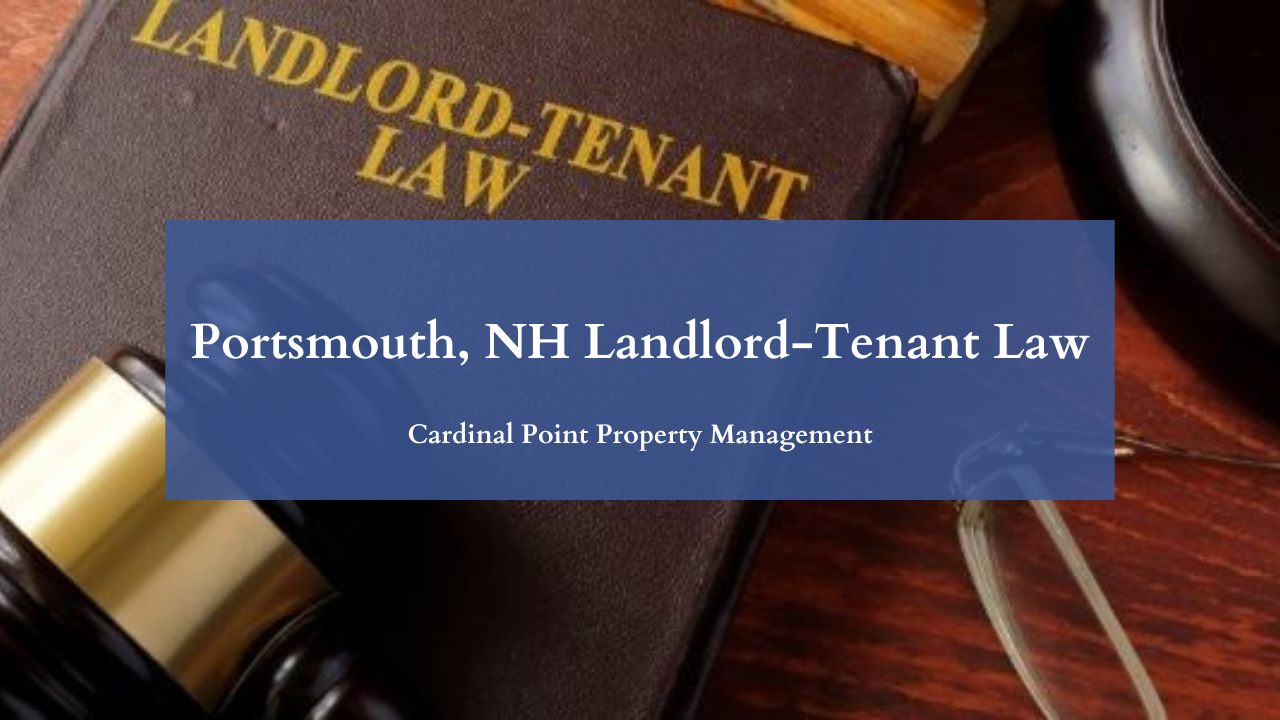Key Takeaways
Clear laws in New Hampshire help both landlords and tenants understand their rights and responsibilities from day one.
Tenants must be notified about things like lead paint and repairs, while landlords need to follow fair rules for rent increases, deposits, and entry.
Repairs, rent changes, and evictions all follow specific timelines, so staying informed can keep everything running smoothly.
The New Hampshire landlord-tenant law provides landlords and tenants with guidelines on their rights and responsibilities once a written or oral rental agreement is established.
As a landlord, it’s important to familiarize yourself with the basics of the aforementioned chapters for a smooth landlording experience.
Fortunately for you, Cardinal Point Property Management has put together a guide to the New Hampshire landlord-tenant laws to get you started.
Required Landlord Disclosures in New Hampshire
Under New Hampshire law, landlords must provide tenants with two key disclosures before move-in:
Lead-Based Paint Disclosure: For properties built before 1978, landlords are federally required to disclose any known information about lead-based paint hazards.
Security Deposit Notice: If collecting a security deposit, landlords must inform tenants of their right to submit a list of any existing damages or needed repairs within 5 days of taking possession of the unit. While tenants are encouraged to provide this list, they are not legally required to do so.
Tenants’ Rights & Responsibilities in New Hampshire
The following are some of the rights that tenants in New Hampshire acquire after establishing a lease with a landlord. A right to:

Tenants have the right to a habitable living space that meets health and safety standards as outlined in RSA 48-A:14.
Be treated fairly as per the Fair Housing Act in New Hampshire.
Be provided with the aforementioned disclosures before assuming tenancy.
A just eviction exercise that isn’t borne out of retaliation, or a Fair Housing Act protected class, such as race or religion.
For issues affecting health and safety, landlords are required to make necessary repairs within 14 days after receiving written notice from the tenant.
Terminate a periodic tenancy after serving the required advance notice.
Tenants are entitled to have their security deposit handled in accordance with state rules, including return within 30 days of lease termination.
Tenants must receive at least 30 days' notice before a rent increase, except in manufactured housing park tenancies, which require 60 days' notice.
Landlords must provide reasonable advance notice before entering the property, except in emergencies. While 48 hours is common practice, New Hampshire law specifies just 24 hours.
The list of responsibilities for tenants in New Hampshire includes the following.
Keep the unit clean and sanitary.
Use the provided fixtures, amenities, and appliances reasonably and for their intended purposes.
Not cause deliberate damage to the property.
Report repair and maintenance issues on time.
Respect the peace and quiet of other tenants or neighbors.
Allow the landlord entry when a proper legal notice is received.
Serve the landlord with the appropriate notice before terminating a periodic tenancy.
Abide by all terms of the lease agreement, including paying rent on time and caring for the unit.

Landlords’ Rights & Responsibilities in New Hampshire
Similarly, the New Hampshire landlord-tenant law accords landlords the following rights. A right to:
Enter a tenant’s rented premises to perform certain lawful functions, such as repairs and inspections, when proper notice is given.
Enforce the terms of the lease agreement, as long as the enforcement is lawful, reasonable, and fair.
Landlords may charge a security deposit, not exceeding one month's rent or $100, whichever is greater.
Raise the rent by whatever amount and as often as necessary, as long as the tenant is given proper notice.
Hold a tenant liable for all rent due under the lease if they break the lease without following the due process.
Break an at-will tenancy after serving the appropriate advance notice.
Draft a proper lease agreement and evict a tenant who fails to abide by all its terms.
Choose not to renew the lease for another term for any lawful reason.
When it comes to responsibilities, the list includes the following for New Hampshire landlords:
Make necessary repairs affecting health and safety within 14 days of receiving proper notification from the tenant.
Carry out the eviction process per the state’s legal procedures.
Refrain from taking any action against a tenant for lawfully exercising their rights in specific situations.
Hold and return security deposits in accordance with state rules, including providing an itemized list of deductions and returning the deposit within 30 days of lease termination.
Give the appropriate advance notice before raising rent.
In accordance with New Hampshire's Fair Housing Act, treat every tenant with respect, equity, and fairness.
Enter a tenant’s rented unit for lawful reasons after giving reasonable advance notice, except in emergencies.
Provide the tenant with the required mandatory disclosures before establishing a lease with them.

An Overview of the Landlord-Tenant Law
The following are the basics of the landlord-tenant laws in New Hampshire.
Tenants’ Rights for Repairs
As a landlord in New Hampshire, you must make requested repairs that affect health and safety within 14 days of getting notified.
It goes without saying that the notice must be written and provide all crucial information necessary for appropriate action.
Tenant Evictions
You can evict a tenant for violating a term of the lease agreement, such as not paying rent. You may also evict a tenant for lawful reasons not tied to lease violations, such as the non-renewal of a month-to-month tenancy.
In addition to that, you must follow the right procedure from start to finish to be successful. Retaliatory evictions, self-help evictions, and those borne from a violating tenant’s FHA-protected characteristics are all illegal.
Security Deposit Rules
When charging a security deposit:
Amount: The deposit must not exceed one month's rent or $100, whichever is greater.
Storage: The deposit must be stored in an FDIC-insured account accruing interest within a New Hampshire financial institution or secured by a bond written by a New Hampshire based company.
Deductions: Landlords may deduct amounts for unpaid rent, unpaid utilities, and all damages exceeding normal wear and tear.
Return: The remaining deposit must be returned to the tenant within 30 days of lease termination, along with an itemized list of any deductions.

Housing Discrimination
As a landlord, you must treat your tenants fairly, equally, and respectfully, as per the state’s antidiscrimination laws.
Specifically, you must abide by the state’s fair housing laws, which outlaw discrimination based on the following protected classes.
Race, color, or national origin
Religion
Familial status
Sex
Sexual orientation
Gender identity
Age
Marital status
Physical disability
Mental disability
The New Hampshire Commission for Human Rights handles fair housing complaints in the state.
Landlord Entry
Landlords have the right to enter the rental property for legitimate reasons, such as repairs, maintenance, inspections, emergencies, and showing the unit to prospective tenants or buyers.
Before entering, landlords must provide 24 hours' advance notice to the tenant, except in emergencies.
Conclusion
There you have it. The important basics of the New Hampshire landlord-tenant law to keep in mind for a smooth landlording experience.
If you have a question or need expert help on any or all landlording matters, then look no further than Cardinal Point Property Management. Get in touch to learn more!
Disclaimer: Please note that the information provided in this blog is intended for general guidance and should not be considered as a replacement for professional legal advice. It is important to be aware that laws pertaining to property management may change, rendering this information outdated by the time you read it.


